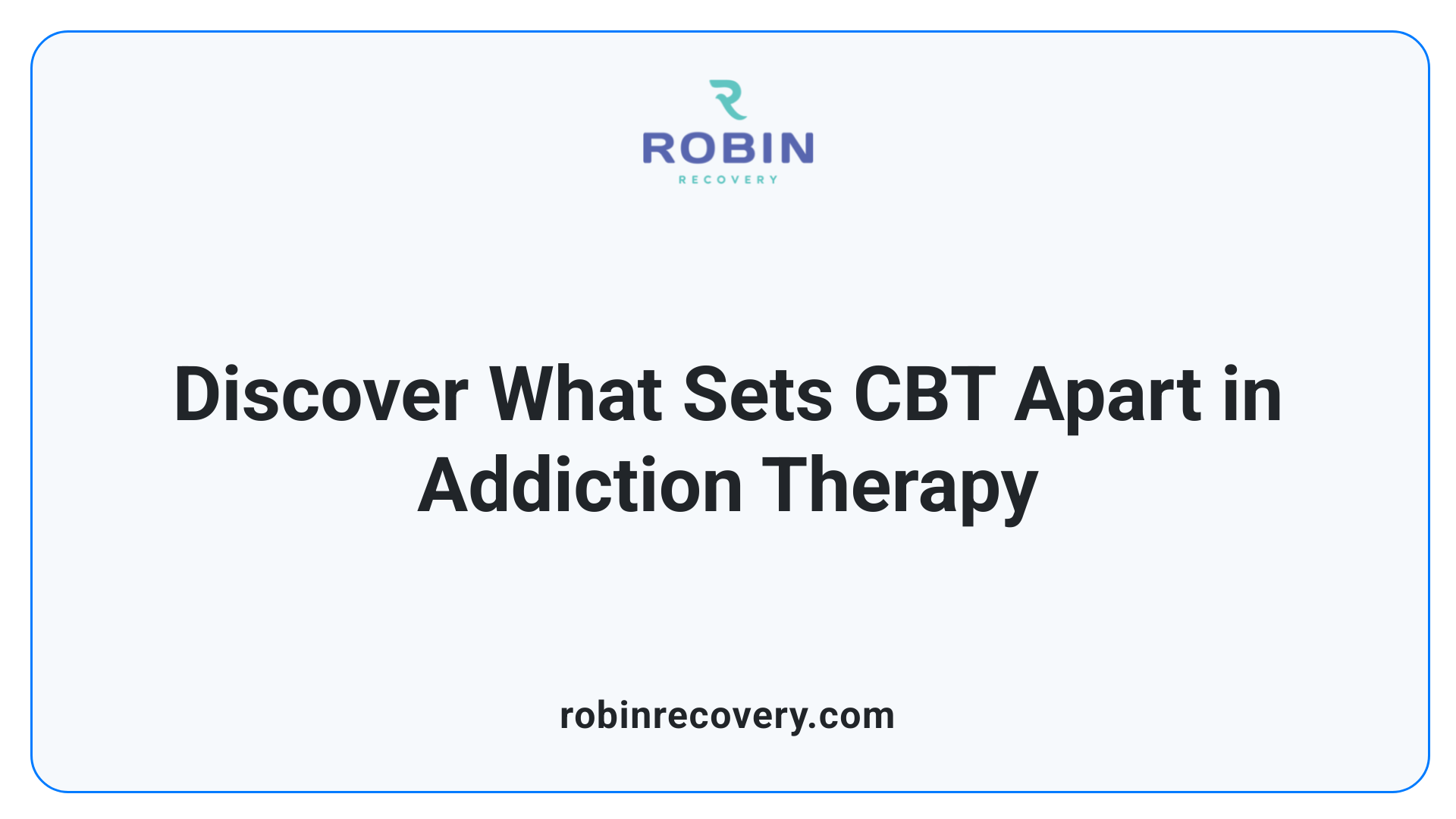The Difference Between Traditional Therapy and CBT for Addiction

Exploring Key Differences in Therapy Modalities
Addiction treatment has evolved significantly, encompassing a variety of therapeutic approaches. Among these, traditional therapy and cognitive-behavioral therapy (CBT) stand out, each with distinct principles, techniques, and effectiveness. This article delves into the core differences between traditional therapy and CBT for addiction, examining their foundational principles, techniques, comparative effectiveness, and factors influencing treatment choices.
Core Principles of Traditional Therapy Versus CBT in Addiction Treatment

What are the core principles of traditional therapy and cognitive-behavioral therapy (CBT) in addiction treatment?
Traditional therapy in addiction treatment typically includes approaches such as psychodynamic and humanistic therapies. These methods focus on uncovering unconscious motives, emotional expression, and exploring personal history to understand the roots of substance use. The aim is to promote insight, emotional healing, and personal growth by delving into past experiences and unresolved psychological conflicts.
In contrast, cognitive-behavioral therapy (CBT) is a structured, action-oriented approach that emphasizes changing unhealthy thought patterns and behaviors linked to addiction. Its foundational principles involve identifying automatic negative thoughts, triggers, and maladaptive beliefs. Therapists use techniques like functional analysis, cognitive restructuring, and skills training to help clients recognize the connections between thoughts, feelings, and actions.
A central goal of CBT is to modify cognitive and environmental triggers that lead to substance use. It addresses motivational barriers by fostering a realistic understanding of addiction and developing coping strategies to manage cravings and prevent relapse. CBT also emphasizes practical skills such as emotion regulation, problem-solving, and interpersonal communication.
While traditional therapy seeks to explore emotional and psychological roots through insight and self-awareness, CBT adopts a more practical approach focused on immediate behavior change. It employs homework assignments, goal setting, and skill rehearsal to reinforce learning and facilitate long-term recovery.
Overall, the key distinction is that traditional therapy aims for emotional insight and psychological understanding, whereas CBT concentrates on actionable change, skill development, and evidence-based strategies to support sobriety and mental health.
Distinctive Features of CBT Compared to Other Traditional Therapy Approaches

How does cognitive-behavioral therapy (CBT) differ from other traditional therapy approaches in treating addiction?
Cognitive-behavioral therapy (CBT) stands out from other approaches through its structured and goal-oriented methodology. Unlike psychodynamic therapies that explore unconscious motives and past experiences, CBT concentrates on current thought patterns and behaviors contributing to addiction.
A key distinction is that CBT emphasizes practical, skills-based interventions such as cognitive restructuring, behavioral activation, and relapse prevention strategies. Therapists work collaboratively with clients to identify and modify dysfunctional thoughts and develop healthy coping mechanisms.
In terms of duration, CBT is generally short-term, usually involving about 10 to 20 focused sessions, which is shorter than many psychodynamic approaches that may last years. This efficiency is partly due to its emphasis on present problems rather than deep exploration of past experiences.
Some forms of therapy, like dialectical behavior therapy (DBT), incorporate mindfulness and emotional regulation, but CBT remains primarily action-focused. Its evidence-based nature, combined with measurable outcomes, makes it especially effective for immediate needs in addiction treatment.
Overall, CBT’s pragmatic and scientific approach provides specific advantages for managing addiction, helping clients develop skills to handle cravings, triggers, and high-risk situations effectively.
Aspect CBT Traditional Psychodynamic Therapy Focus Duration Techniques Approach Present-focused, goal-oriented Past and unconscious exploration Current thoughts & behaviors Short-term (10-20 sessions) Cognitive restructuring, behavioral strategies Focus Skill development, coping strategies Uncovering root emotional conflicts Symptoms and behavioral patterns Variable, often long-term Exploring unconscious motives, insight Evidence base Strong (peer-reviewed, measurable) Moderate, with emphasis on insight Practical problem solving Designed for quick results Mindfulness, emotional regulation in some variants
This comparison highlights how CBT’s practical, evidence-driven, and immediate application approach makes it particularly suited for addiction treatment, focusing on current issues and solving them efficiently.
Techniques and Methods Used in CBT for Addiction Recovery

Cognitive Behavioral Therapy (CBT) employs a range of techniques and methods specifically designed to support individuals in overcoming addiction. Central to this approach is cognitive restructuring, which helps clients identify automatic negative thoughts and evaluate the evidence for and against these beliefs. This process encourages the development of healthier, more realistic thinking patterns.
Behavioral experiments and behavioral activation are also integral; they involve testing out new behaviors in real-life situations to challenge negative assumptions and reinforce positive actions. For instance, clients might try and succeed in resisting a craving or engaging in a healthy activity instead of substance use. Exposure therapy is sometimes used to gradually confront high-risk triggers in a controlled manner, reducing their power over time.
Skills training and coping strategies form another core element. These include social skills training, problem-solving techniques, stress management, relaxation practices like deep breathing, mindfulness, and imagery rehearsal. These strategies equip clients with practical tools to handle cravings, high-stress situations, and emotional distress.
Homework assignments are a pivotal part of CBT, allowing clients to practice learned skills outside of therapy sessions. These assignments might include keeping thought records, practicing coping techniques, or engaging in planned activities that promote recovery. Such real-world practice reinforces therapy gains and fosters independence.
Relapse prevention is heavily emphasized to help clients recognize high-risk scenarios and develop personalized response plans. By increasing awareness of triggers and cultivating resilience through skill development, individuals are better prepared to maintain sobriety long-term.
Overall, CBT’s multifaceted approach addresses both the cognitive and behavioral aspects of addiction. Its structured methods focus on empowering individuals to understand their thought and behavior patterns, build healthier habits, and sustain recovery through continuous self-awareness and adaptive coping.
Evidence of CBT Effectiveness and Benefits in Addiction Treatment

How effective is CBT for addiction recovery and how does it compare to other therapy approaches?
Cognitive Behavioral Therapy (CBT) is a cornerstone in addiction treatment, extensively supported by scientific research due to its proven efficacy. Meta-analyses have shown that CBT produces a moderate effect size of around 0.45, indicating significant, meaningful benefits for individuals struggling with substance use disorders.
CBT is particularly effective for specific substances, with larger effects observed in cannabis dependence, followed by cocaine and opioids. The therapy focuses on identifying and modifying dysfunctional thoughts and behaviors that contribute to substance use, developing coping strategies, and preventing relapse.
Durability of CBT effects has been demonstrated through follow-up studies; some patients maintain abstinence over a year or more after completing treatment. This suggests that the skills and strategies learned in CBT have lasting impacts.
In comparison to other treatment modalities, such as Motivational Interviewing or contingency management, CBT is often used alongside these methods but stands out as a structured, goal-driven approach. Its flexibility allows delivery in individual or group formats, including digital platforms, expanding accessibility.
Research indicates that while CBT performance is comparable to other evidence-based therapies, its emphasis on present-focused problem solving, skill-building, and relapse prevention makes it particularly effective. Overall, CBT remains a well-established, reliable therapy that significantly improves abstinence rates and psychosocial functioning, with benefits sustained over time.
Aspect Effectiveness Substance Focus Delivery Format Additional Notes Effect Size Moderate (0.45) Cannabis, cocaine, opioids Individual, group, digital Proven durable over 52 weeks Impact Reduced substance use, improved coping Multiple substances In-person or online Widely adopted, evidence-based Comparison Similar or superior to other therapies Various co-occurring issues Flexible Focus on present, practical skills
Factors Influencing the Choice of Therapy in Addiction Treatment

When selecting the most suitable therapy for addiction recovery, several important factors come into play. Patients' individual needs, their motivation levels, and whether they have co-occurring mental health disorders significantly influence the decision.
Cognitive Behavioral Therapy (CBT) is widely recognized for its effectiveness in treating substance use disorders. It offers skills training, relapse prevention strategies, and tools to manage triggers that lead to substance use. These strengths make it a strong candidate for many individuals, especially those who prefer structured, goal-oriented approaches.
Availability of resources and therapist expertise also impact the choice. Not all treatment centers have trained professionals in every modality, such as CBT, family therapy, or contingency management. The familiarity of the therapist with evidence-based interventions can guide the decision, ensuring the individual receives effective, tailored care.
Personal preferences and specific treatment goals are equally important. Some may opt for therapies that explore underlying issues, while others seek practical strategies to manage cravings and high-risk situations. Furthermore, motivation to engage actively in therapy can influence whether an individual benefits more from short-term, skills-based approaches like CBT or from longer-term psychodynamic therapies.
Considering these factors, a comprehensive assessment by a healthcare professional helps determine whether traditional therapy, CBT, or a combination of approaches best suits the patient's circumstances and recovery objectives.
Factor Considerations Additional Details Patient needs & motivation Level of readiness, co-occurring disorders, treatment goals Impacts therapy selection and engagement Resource availability Access to trained therapists and treatment facilities Affects feasibility of certain approaches Personal preferences Desire for structure, focus on skills or underlying issues Influences therapy acceptance and compliance Therapist expertise Experience with evidence-based practices Ensures quality and tailored care
Ultimately, understanding these diverse factors enables clinicians and individuals to choose the most effective and personalized treatment plan, increasing the chances of successful recovery.
Incorporating Mindfulness and Digital Innovations into CBT
How does mindfulness-based cognitive behavioral therapy (MBCT) differ from traditional CBT?
Mindfulness-based cognitive behavioral therapy (MBCT) varies from traditional CBT mainly in its approach to thoughts and feelings. While standard CBT focuses on identifying and challenging negative thought patterns to alter behaviors, MBCT emphasizes mindfulness and acceptance practices. It teaches individuals to observe their thoughts nonjudgmentally, recognizing that they are not facts, which helps prevent relapse particularly in recurrent depression. MBCT combines meditation, breathing exercises, and cognitive strategies to promote present-moment awareness and decentering. This contrasts with CBT’s emphasis on restructuring thoughts and behavioral activation. Both methods are effective for mood disorders, but MBCT’s focus on acceptance and experiential awareness makes it especially useful for relapse prevention.
What advantages do digital CBT programs offer in addiction treatment?
Web-based CBT programs such as CBT4CBT offer numerous benefits, especially in expanding access to effective care. They allow individuals who face barriers like distance, high costs, or limited time to engage in therapy remotely. These online platforms incorporate core CBT techniques, including cognitive restructuring, relapse prevention, and skills training, delivered through interactive modules. They often feature regular monitoring, personalized exercises, and immediate feedback, which can boost engagement and adherence.
Research indicates that digital CBT programs can achieve similar reductions in substance use compared to traditional therapy. They also tend to improve treatment retention and are cost-effective, making them a promising addition or alternative to in-person services. Integrating these platforms with periodic clinical oversight enhances their effectiveness, helping to reach more individuals seeking treatment for addiction and related mental health concerns.
Choosing the Most Suitable Approach for Recovery
Selecting the appropriate therapy for addiction depends on individual circumstances, including the nature of the addiction, co-occurring conditions, personal preferences, and available resources. While traditional therapy explores emotional and unconscious drivers, CBT offers a practical, structured path to change through skill development and cognitive restructuring. Comparing their principles, techniques, and evidence, it's clear that CBT is a highly effective, adaptable, and goal-oriented approach suitable for many individuals seeking recovery. Integrating new formats like digital CBT and mindfulness-based methods further enhances the capacity to deliver accessible and personalized treatment, ensuring that each individual can find a pathway to lasting sobriety.
References
- Cognitive-Behavioral Therapy for Substance Use Disorders - PMC
- Cognitive Behavioral Therapy (CBT) for Addiction & Substance Abuse
- Cognitive Behavioral Therapy - Addiction Center
- Cognitive Behavioral Therapy (CBT) in Addiction Treatment
- Cognitive behavioral therapy - Mayo Clinic
- How CBT Improves Addiction Treatment Outcomes
- Differences in CBT and DBT For Addiction Treatment
- Cognitive Behavioral Therapy for Addiction: Techniques
- 10 Types Of Therapies For Addiction Treatment
- Traditional Psychotherapy vs. Cognitive Behavioral Therapy
